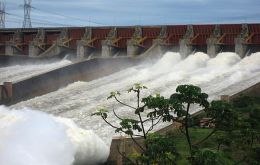MercoPress. South Atlantic News Agency
Economy
-
Thursday, September 1st 2011 - 02:37 UTC
US private sector job growth slowed in August for second month running

The pace of US private sector job growth slowed in August for the second month in a row with employers adding 91,000 positions, a report by a payrolls’ processor showed Wednesday.
-
Thursday, September 1st 2011 - 01:13 UTC
S&P upgrades Paraguay’s rating on greater revenue from the Itaipú dam

Standard & Poor's ratings services upgraded Mercosur member Paraguay's credit status a notch after the country reached an agreement with neighboring Brazil to take more revenue from the shared Itaipú hydroelectric complex, the world’s largest operational dam.
-
Wednesday, August 31st 2011 - 21:29 UTC
Controversy over US highest paid CEOs and taxes paid by their companies

The 25 highest paid US chief executives earned more last year than their companies paid in federal income tax, a study has said. The average annual remuneration of the 25 bosses was 16.7 million dollars, the left leaning think tank Institute for Policy Studies (IPS) found.
-
Wednesday, August 31st 2011 - 21:24 UTC
Merkel bets she can convince ruling coalition sceptics to further support the Euro

German Chancellor Angela Merkel's cabinet approved Wednesday new powers for the Euro zone's bailout fund, kicking off a month-long battle to convince sceptics in her conservative camp to back efforts to contain the bloc's crisis.
-
Wednesday, August 31st 2011 - 21:21 UTC
US grain farmers furious with Argentina and Canada advance in the Colombia market

Argentina has rapidly displaced the US as the main supplier to Colombia of corn and in near future wheat, with volumes soaring from 99.000 tons in 2007 to over 2.2 million tons currently, points out Agrimoney.
-
Wednesday, August 31st 2011 - 21:17 UTC
US consumers’ confidence plummets to lowest since April 2009 on jobs concern

The confidence of US consumers in the country’s economy fell sharply in August and reached its lowest level since April 2009, The Conference Board reported on Tuesday, attributing the decline in part to the lengthy congressional negotiations to raise the debt limit.
-
Wednesday, August 31st 2011 - 19:40 UTC
Venezuela economy expands 2.5% in 2Q, down from 4.8% in first quarter

Venezuela’s second quarter (2Q) Gross Domestic Product (GDP) was 2.5%, below the expectations of the Government and below the first quarter GDP’s 4.8% rate, probably indicating that the Government’s effort to prop the economy via fiscal spending is losing steam.
-
Wednesday, August 31st 2011 - 19:24 UTC
Britons and French most pessimistic about economic prospects shows Ipsos Mori world survey

Britons are among the most pessimistic in the world about their country’s economic prospects, it was revealed this week. Just 9% of respondents in the Ipsos MORI survey expect an improvement in their economy in six months’ time, a figure only beaten by the French with 3%.
-
Wednesday, August 31st 2011 - 09:03 UTC
Humala becomes Wall Street ‘darling boy’, and S&P raises Peru’s foreign debt rating

Peru had its foreign debt rating raised one level by Standard & Poor’s, which said it expects recently elected President Ollanta Humala to continue policies that support the country’s economic expansion.
-
Wednesday, August 31st 2011 - 09:00 UTC
Dissenting Fed member pledges unity but makes different reading of data available

Federal Reserve Bank of Minneapolis President Narayana Kocherlakota signalled he would not attempt to annul the Fed’s commitment to keep interest rates near zero through mid-2013.
